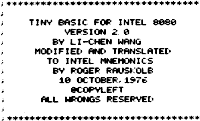|

A
copyright, as
you know, is legal protection against unauthorized usage or obvious modification
of original creative works, something most people who generate valuable works like
because it represents a right to private property. A
copyleft, on
the other hand, is an alternative which permits free distribution of original works
with the only restriction being that it and/or derivative works also be declared
copyleft material.
Note how evil Capitalist companies like IBM,
Artech House publishers, and
Rohde & Schwarz copyright
and patent everything they create in order to benefit financially from the work
of their employees. Doing so allows them to provide good wages and benefits while
creating useful goods and services for customers.
Liberal-dominated companies like Google, Apple, and Facebook, by contrast, allow
everything they create to be freely copied and/or modified by anyone. Their only
concern is the welfare of fellow men. Oh, wait. The fact is those kinds of companies
also copyright and patent everything they create. Benevolent distribution of freebies
usually is only the mindset of people wanting access to stuff without earning it,
and then they are usually the first to cry "foul" if someone else takes their stuff.
You don't see wealthy movie stars, music artists, and sports figures opening their
homes to street people or leaving their fleets of vehicles gassed (or charged) up
at the side of the road for anyone to use.
I have seen the copyleft logo in a few places when searching for freeware and
shareware software and thought maybe it was just someone lampooning copyright protection,
but upon further research I learn it is a very real form of protection for original
works. Here is the distinction, in a nutshell (per Wikipedia entries):
 The concept of "copyleft," while not explicitly
called that, was first formerly encompassed in the spirit of the 1985
GNU Manifesto,
where founder Richard Stallman declared, "GNU is not in the public
domain. Everyone will be permitted to modify and redistribute GNU, but no distributor
will be allowed to restrict its further redistribution. That is to say, proprietary
modifications will not be allowed. I want to make sure that all versions of GNU
remain free." Note that copyleft does not place the works in the
public domain,
which puts no restrictions on usage. The suspected first public declaration of copyleft
was by Tiny BASIC's
creator Li-Chen Wang. The concept of "copyleft," while not explicitly
called that, was first formerly encompassed in the spirit of the 1985
GNU Manifesto,
where founder Richard Stallman declared, "GNU is not in the public
domain. Everyone will be permitted to modify and redistribute GNU, but no distributor
will be allowed to restrict its further redistribution. That is to say, proprietary
modifications will not be allowed. I want to make sure that all versions of GNU
remain free." Note that copyleft does not place the works in the
public domain,
which puts no restrictions on usage. The suspected first public declaration of copyleft
was by Tiny BASIC's
creator Li-Chen Wang.
Now when you spot a backwards copyright symbol, you know it is for real. As with
copyrighted material, copylefted material is also subject to the "Fair Use Act."
While on the subject of copyrights, content generated by Artificial Intelligence
(AI) is not protected by copyright because the courts have decreed that copyright
may only be assigned to humans. The following copyleft versus copyright thesis was
generated at my request by ChatGPT. It can be considered to be copylefted, unlike
the rest of this page content, which is copyrighted.
|





 "
"



